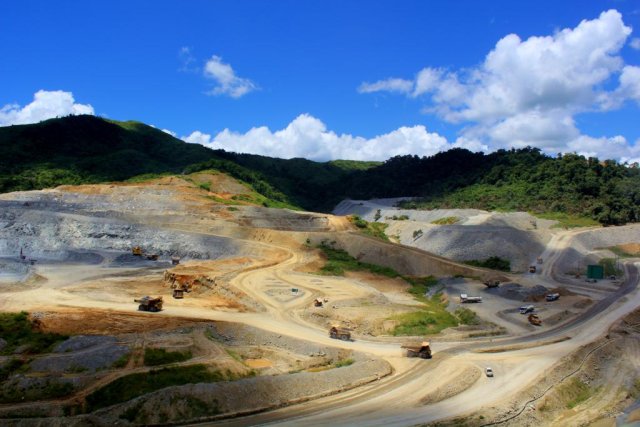
Australian-New Zealand mining company OceanaGold has destroyed the isolated rural village of Didipio in the mountains of Kasibu in Nueva Vizcaya, a province of the Philippines.
OceanaGold has operated one of six mining projects in the Philippines covered by the Financial or Technical Assistance Agreement (FTAA) since 1994. Fierce resistance from villagers, legal struggles and the financial problems of the company meant it was only this year that OceanaGold was able to ship out its first 5000 tons of copper-gold concentrate.
Thousands of trees from a big biodiversity corridor in the Sierra Madre mountain range were cut down to make way for a 765-hectare open-pit mine, replacing the mountain of Dinkidi.
Discovered as a body of ore by Australian firm Climax-Arimco, Dinkidi has disappeared from the peaks of Mamparang, a significant wildlife corridor. The villagers say that wildlife such as deers, wild boar and hornbills have already disappeared. Mudfish, snails and prawns can no longer be caught in the river, which has also changed in odour and appearance.
The villagers, from the indigenous Ifugao tribes, who used to plant rice in its terraced slopes or grow citrus orchards, are now living in wooden houses outside the gates of the mining complex and most are working as labourers. A handful of the biggest landowners sold the choicest parcels of land to the company and have left the area. One couple, Margarita and Eduardo Licyayo, said they had been cheated of their eight-hectare land in Sitio Bacbacan.
They thought they were signing for a loan and that their land was the collateral. Instead, they were told they had sold the land to the company. The contract was in English, which they didn't understand. In August, Eduardo visited their remaining land where he was growing corn and squash crops. He found it paved in concrete. OceanaGold security guards wrestled him to the ground and handcuffed him. Eduardo has now been charged with attempted homicide.
The mine tailings have been dumped in huge ponds, a mixture of toxic waste, including arsenic, radioactive material, sulphur, mercury and cyanide. The tailing pond has been moved without any review of the leaks into the water supply.
An new agreement with the Benigno Aquino government has removed environmental protections and tripled the size of the mine.
Many villagers fear that the mine tailing pond might overflow and flood their community.
The township of Lower Alimit is a target for OceanaGold expansion. It is a snapshot of what Didipio used to look like. Only three kilometres from the mine, Lower Alimit is now also affected by the mining operations.
Rice fields are filled with silt and the river is the color of sardines. The rice plants are stunted and diseased because of the silt and toxins in the water used for irrigation. The drinking water has also been affected, leading to rising cases of diarrhoea. The villagers are now being forced to pay for clean water.
Most farmers in Didipio have become mine workers, paid half the wage of workers hired from Manila.
Martin Duhalngon was hired as an engineer and became active in the workers' union. He and the union president, Wendy Nicano, were subsequently dismissed in November last year on trumped up charges.
In protest, the workers staged a blockade of Oceana Gold vehicles. They were quickly dispersed by Filipino police.
The company claims a five-year exemption from tax under the FTAA, which means it pays nothing to the government, the province nor the villagers of Didipio.
OceanaGold recently reported the mine produced 20,550 ounces of gold and 9370 tons of copper during the first half of this year, far surpassing its annual target. There are 16 other exploration sites within Didipio, one a hill called Dibio, right next to the open pit. The FTAA agreement covers 37,000 hectares of land straddling the provinces of Nueva Vizcaya, Isabella and Quirino. The agreement should expire in 2019 but under Filipino law, it is renewable for a further 25 years.
The struggle to stop the mine has been fierce. In 1994, the year the FTAA was approved by President Fidel Ramos, a farmer shot down a helicopter carrying out aerial mapping of the area. In response, the Philippine Army camped beside Dinkidi Hill and terrorised the population.
In 2008, the villages set up a barricade to prevent the forcible demolition of their homes. They were surprised at dawn by Oceana guards and a group of soldiers, who opened fire. In February, the barangay captain [village major], Ereneo Bobolla, led a road blockage as the company refused to pay the 2% excise tax on processed minerals.
Didipio was one of four mining affected areas in Nueva Vizcaya that was visited by a national fact-finding mission of environmental, indigenous and church groups over September 17-21. They are calling for an investigation into the environmental destruction, human rights abuses and theft committed by the Australian mining companies.